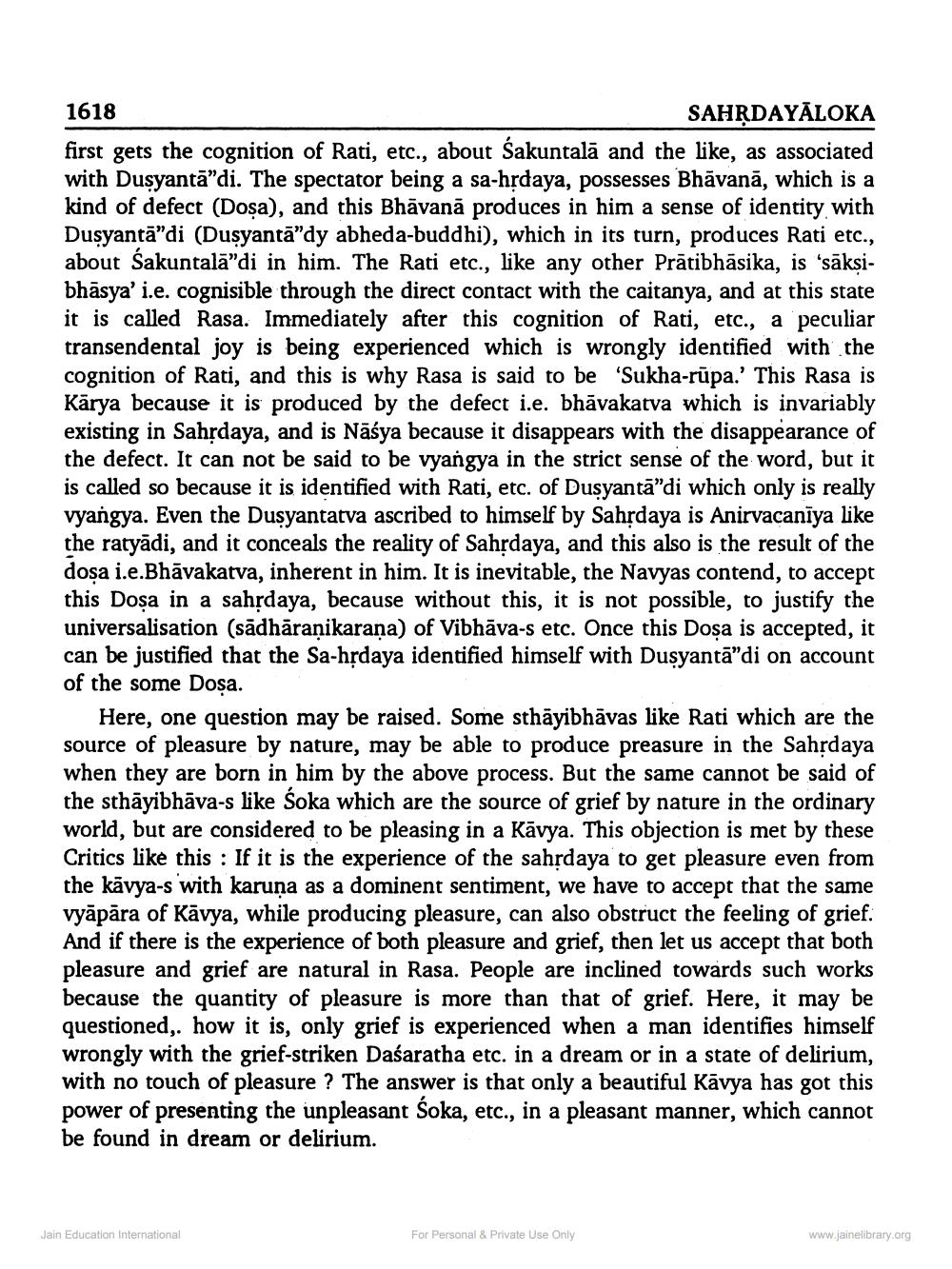________________
1618
SAHRDAYĀLOKA first gets the cognition of Rati, etc., about Sakuntalā and the like, as associated with Dusyantā"di. The spectator being a sa-hrdaya, possesses Bhāvanā, which is a kind of defect (Dosa), and this Bhāvanā produces in him a sense of identity with Dusyantā"di (Dusyantā"dy abheda-buddhi), which in its turn, produces Rati etc., about Sakuntalā"di in him. The Rati etc., like any other Prātibhāsika, is 'sāksibhāsya' i.e. cognisible through the direct contact with the caitanya, and at this state it is called Rasa. Immediately after this cognition of Rati, etc., a peculiar transendental joy is being experienced which is wrongly identified with the cognition of Rati, and this is why Rasa is said to be 'Sukha-rūpa.' This Rasa is Kārya because it is produced by the defect i.e. bhāvakarva which is invariably existing in Sahrdaya, and is Nāśya because it disappears with the disappearance of the defect. It can not be said to be vyangya in the strict sense of the word, but it is called so because it is identified with Rati, etc. of Dusyantā"di which only is really vyangya. Even the Dusyantatva ascribed to himself by Sahrdaya is Anirvacanīya like the ratyādi, and it conceals the reality of Sahrdaya, and this also is the result of the dosa i.e.Bhāvakatva, inherent in him. It is inevitable, the Navyas contend, to accept this Dosa in a sahrdaya, because without this, it is not possible, to justify the universalisation (sādhāranikarana) of Vibhāva-s etc. Once this Dosa is accepted, it can be justified that the Sa-hțdaya identified himself with Dusyantā"di on account of the some Dosa.
Here, one question may be raised. Some sthāyibhāvas like Rati which are the source of pleasure by nature, may be able to produce preasure in the Sahrdaya when they are born in him by the above process. But the same cannot be said of the sthāyibhāva-s like Soka which are the source of grief by nature in the ordinary world, but are considered to be pleasing in a Kāvya. This objection is met by these Critics like this : If it is the experience of the sahrdaya to get pleasure even from the kavya-s with karuna as a dominent sentiment, we have to accept that the same vyāpāra of Kāvya, while producing pleasure, can also obstruct the feeling of grief. And if there is the experience of both pleasure and grief, then let us accept that both pleasure and grief are natural in Rasa. People are inclined towards such works because the quantity of pleasure is more than that of grief. Here, it may be
estioned, how it is, only grief is experienced when a man identifies himself wrongly with the grief-striken Daśaratha etc. in a dream or in a state of delirium, with no touch of pleasure ? The answer is that only a beautiful Kāvya has got this power of presenting the unpleasant Soka, etc., in a pleasant manner, which cannot be found in dream or delirium.
Jain Education International
For Personal & Private Use Only
www.jainelibrary.org




